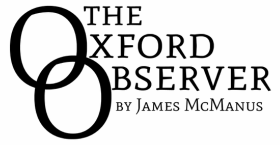Almost 4 months after returning to the US, I am realizing and observing the long-term impacts of my time in England. Yes, I do have cravings for tea and yes, I do still say "mum" instead of "mom," but I am starting to realize and understand the nuances of our two cultures.
I heard a quote the other day that seems to sum it up fairly succinctly: "We are two nations divided by a current language." A great example is how I cannot refer to the things we wear on our lower bodies with legs as "pants" anymore. In England, "pants" are what Americans call "underwear" and because of my justified fear of accidentally talking about someone's underwear in a polite setting, I pause and say "trousers" every time. At one point in my trip, I completely forgot the American word for a place where you go to watch newly released movies. "Cinema" is the correct term there, "movie theatre" here. Click here for a comprehensive guide to American and British words.
What does this have to do with education? Besides the fact that I stood up in front of a crowd of 60 four- and six-year-olds and mentioned about how "some of our pants are white" (as I'm sure you can guess, there was a big giggle from them after that). British schoolchildren are taught a word that is not really in the everyday vocabulary of most Americans: sensible. From a very young age (three or four), students are reminded to "sit and act sensibly." For those Americans who know this word but are unsure as to the exact meaning, here you go:
I heard a quote the other day that seems to sum it up fairly succinctly: "We are two nations divided by a current language." A great example is how I cannot refer to the things we wear on our lower bodies with legs as "pants" anymore. In England, "pants" are what Americans call "underwear" and because of my justified fear of accidentally talking about someone's underwear in a polite setting, I pause and say "trousers" every time. At one point in my trip, I completely forgot the American word for a place where you go to watch newly released movies. "Cinema" is the correct term there, "movie theatre" here. Click here for a comprehensive guide to American and British words.
What does this have to do with education? Besides the fact that I stood up in front of a crowd of 60 four- and six-year-olds and mentioned about how "some of our pants are white" (as I'm sure you can guess, there was a big giggle from them after that). British schoolchildren are taught a word that is not really in the everyday vocabulary of most Americans: sensible. From a very young age (three or four), students are reminded to "sit and act sensibly." For those Americans who know this word but are unsure as to the exact meaning, here you go:
1. Done or chosen in accordance with wisdom or prudence; likely to be of benefit
As I've seen it used in British schools, "sit sensibly," I would define it as "don't be silly." Daniel Darkings, age 21, educated in the UK for his entire school life, defines sensible as "doing something that follows common sense." I asked him what it would mean if someone said "sit sensibly" and, without any prompting or guiding at all, he replied "to behave myself and not do anything silly." Clearly my observation was correct in regards to the silly/sensible continuum.
I have seen some great behaviour from English schoolkids during assemblies, whose only guidance in the matter was to "act sensibly" and "not be silly." Maybe we should try inserting the word into our American lexicon.....
I have seen some great behaviour from English schoolkids during assemblies, whose only guidance in the matter was to "act sensibly" and "not be silly." Maybe we should try inserting the word into our American lexicon.....


 RSS Feed
RSS Feed
